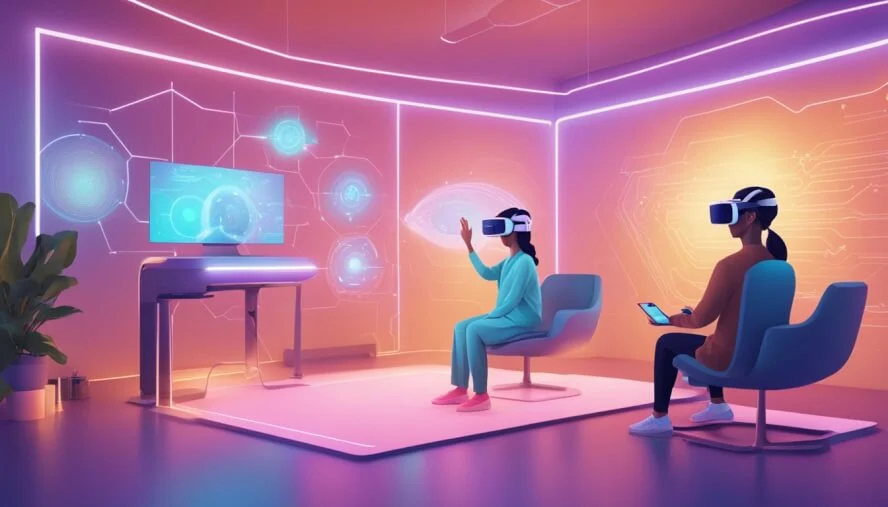The mental health industry is undergoing a digital revolution, with online therapy becoming more popular than ever. As technology advances and demand for accessible mental health support grows, new trends are shaping the future of therapy online. From AI-driven mental health tools to virtual reality therapy, innovations are making counseling more effective, personalized, and accessible.
This article explores key trends that are set to redefine online counseling and improve the way people receive mental health support.
1. Artificial Intelligence (AI) in Therapy
AI is transforming online therapy by providing:
- Chatbots for mental health support – AI-powered bots can offer immediate responses, guiding users through emotional distress.
- Personalized therapy plans – AI analyzes user data to tailor therapy approaches based on individual needs.
- Improved therapist-client matching – AI helps match clients with the best-suited online therapist based on personality and mental health needs.
📈 Trend Impact: AI will enhance accessibility by providing instant emotional support while ensuring human therapists remain at the core of counseling.
2. Virtual Reality (VR) Therapy
VR therapy is emerging as an effective tool for treating anxiety, phobias, and PTSD. With VR, clients can:
- Simulate real-life scenarios in a controlled environment.
- Practice stress-reduction techniques in immersive settings.
- Overcome fears through exposure therapy guided by a therapist online.
📈 Trend Impact: VR will make therapy more interactive and engaging, helping individuals process trauma and fears in a safe environment.
3. Expansion of Teletherapy Coverage
As demand for online counseling increases, more insurance providers and governments are recognizing its benefits. Key developments include:
- Increased insurance reimbursement – More health plans now cover therapy online, making it affordable for more people.
- Employer-sponsored online therapy programs – Businesses are incorporating mental health services into employee wellness programs.
📈 Trend Impact: Greater affordability and coverage will make affordable therapy online accessible to millions worldwide.
4. Integration of Wearable Technology
Wearable devices like smartwatches and fitness trackers are being integrated into online therapy to:
- Monitor heart rate and stress levels.
- Track sleep patterns and mood fluctuations.
- Provide therapists with real-time data to personalize treatment plans.
📈 Trend Impact: Wearable technology will help therapists offer data-driven insights for more effective stress and mental health management.
5. Growth of Free and Low-Cost Therapy Options
Mental health accessibility is a major focus, leading to an increase in:
- Free online counseling platforms like 7Cups, offering peer support and community engagement.
- Nonprofit initiatives providing affordable therapy online for underserved communities.
- Sliding-scale pricing models, making professional therapy more budget-friendly.
📈 Trend Impact: A wider range of financial options will ensure that mental health support is available to everyone.
6. Personalized and Hybrid Therapy Models
A shift towards hybrid therapy is creating a balance between therapy online and in-person sessions. Hybrid therapy offers:
- A mix of virtual and in-office sessions – Clients can choose the format that best suits their needs.
- More flexibility – Individuals can access their therapist online while maintaining periodic in-person check-ins.
📈 Trend Impact: Hybrid therapy will provide personalized care while maintaining the effectiveness of face-to-face interactions.
7. Expansion of Therapy for Niche Audiences
More online counseling services are being tailored for:
- Teens and young adults – Platforms designed for youth mental health concerns.
- Minority and culturally diverse communities – Culturally sensitive therapy options.
📈 Trend Impact: Niche therapy services will create more inclusive mental health solutions for different communities.
8. Enhanced Data Security and Privacy Measures
As therapy online grows, concerns about privacy and data security are being addressed through:
- Stronger encryption and secure platforms to protect client confidentiality.
- HIPAA-compliant online therapy providers ensuring legal protection.
- AI-driven security solutions to detect and prevent data breaches.
📈 Trend Impact: Improved security will build trust and encourage more people to seek online counseling.
9. Integration of Mindfulness and Holistic Approaches
Future online therapy services will increasingly incorporate:
- Meditation and mindfulness practices to complement traditional therapy.
- Holistic mental health approaches, including nutrition and lifestyle coaching.
- Alternative therapies like art therapy, music therapy, and yoga.
📈 Trend Impact: A more comprehensive approach to mental well-being will enhance the effectiveness of therapy.
Conclusion
The future of therapy online is evolving rapidly, bringing new opportunities for improved mental health care. With advancements in AI, VR, teletherapy coverage, and wearable technology, online counseling is becoming more personalized, accessible, and effective.
As mental health awareness grows, these innovations will ensure that individuals receive the support they need in a way that fits their lifestyle and preferences. Whether through affordable therapy online, free online counseling, or hybrid models, the future of mental health care is brighter than ever.







Leave a Reply